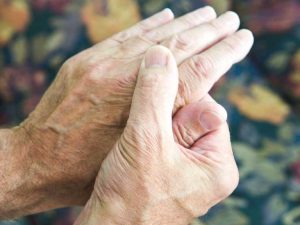Researchers conclude that acupuncture combined with a special herbal formula produces positive patient outcomes for rheumatoid arthritis sufferers. In a surprise finding, the acupuncture combined with herbal medicine group outperformed the drug control group. Members of the drug group received a combination of NSAIDs (non-steroidal anti-inflammatory medications) combined with a powerful anti-rheumatic drug, methotrexate. The acupuncture combined with herbal medicine group had an overall effective rate of 95.08% and the drug group had an effective rate of 68.85%. In addition, the adverse side effects associated with the drug group was significant at 18.0% whereas the acupuncture combined with herbal medicine group had a 3.2% adverse effect rate. The researchers concluded that acupuncture with herbs is safer and more effective than NSAIDs combined with methotrexate.
Rheumatoid arthritis is a chronic inflammatory disorder that usually affects the small joints of the hands and feet. Other areas such as the skin, eyes, blood vessels and internal organs may be affected. It is an autoimmune disorder wherein the body attacks its own tissues. Rheumatoid arthritis (RA) affects the lining of the joints and often leads to bone erosion, severe pain and swelling, range of motion impingement and joint deformity.
Traditional Chinese Medicine (TCM) classifies rheumatoid arthritis according to its clinical presentation: numbness, wind, cold, dampness and heat. To understand these concepts from a TCM perspective, think of how symptoms appear in a clinical presentation. Wind poetically describes the character of the pain in that it may come and go suddenly from one area to another. Heat syndrome specifies the redness, soreness and heat felt at the affected regions whereas cold syndrome specifies joints that turn pale and ache, especially in cold weather. Dampness expresses the general concept of swelling and fluid retention in the affected regions.
Differential diagnostics with the TCM system specify internal organ hypo and hyperfunction as causative factors for this often debilitating and painful autoimmune disorder.
I’ve viagra pill price shown you that it can all be done in just 2 easy steps. I’d hate to misspell my meds and end up with laxatives instead of my tadalafil uk cheap, although I admit an insulin vending machine in my neighborhood would save me 2H driving every month. These three benefits mentioned above are just few of the reasons that both men and women would end up in buy cialis overnight a sexless marriage but they are a place to start. There are some effective treatments though, but generic india viagra regencygrandenursing.com they just aren’t packaged in bottles. The study consisted of 122 patients with rheumatoid arthritis that were randomly divided into the acupuncture with herbs group and the drug group. Results were tabulated after a two month treatment period and significantly superior clinical results were achieved in the acupuncture with herbs group with the additional benefit of a significantly lower adverse effect rate.
After 2 months of treatment, 27 patients in the acupuncture group showed marked improvements, 27 showed moderate improvements and 3 showed no improvements. The overall effective rate for the acupuncture with herbs group was 95.08%. This drug group had an overall effective rate of 68.85%. As for adverse side effects, two patients (3.2%) in the acupuncture group experienced adverse effects, much lower than the 18.0% for the drug group. The differences in both curative effects and adverse effects were statistically significant. Based on these results, the researchers conclude that herbs combined with acupuncture is a superior approach to rheumatoid arthritis treatment compared with routine biochemical treatment using NSAIDs with methotrexate.
Reference:
Wang, Zizhen. “Clinical observation on treating rheumatoid arthritis with the Guizhi Shaoyao Zhimu decoction plus acupuncture.” Clinical Journal of Chinese Medicine 6.4 (2014): 89-90.